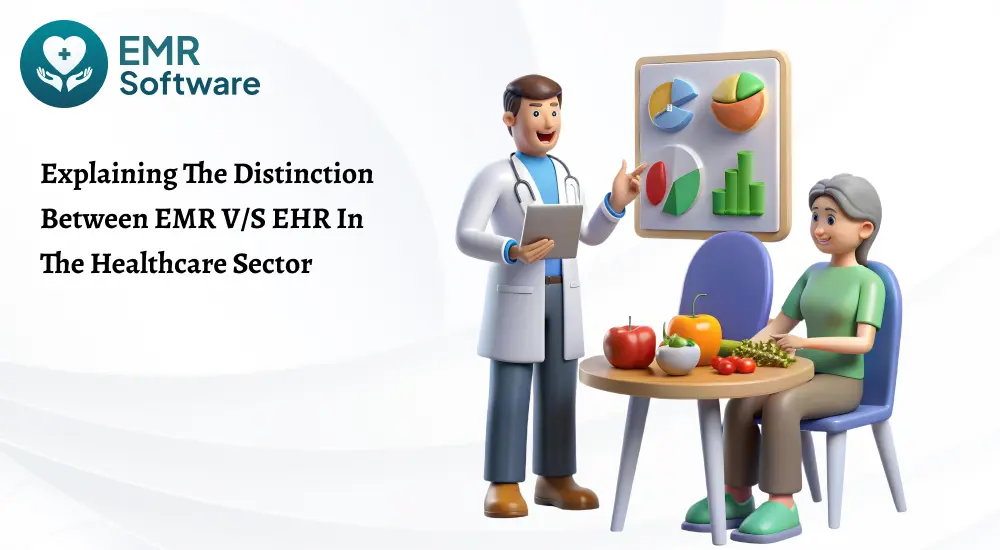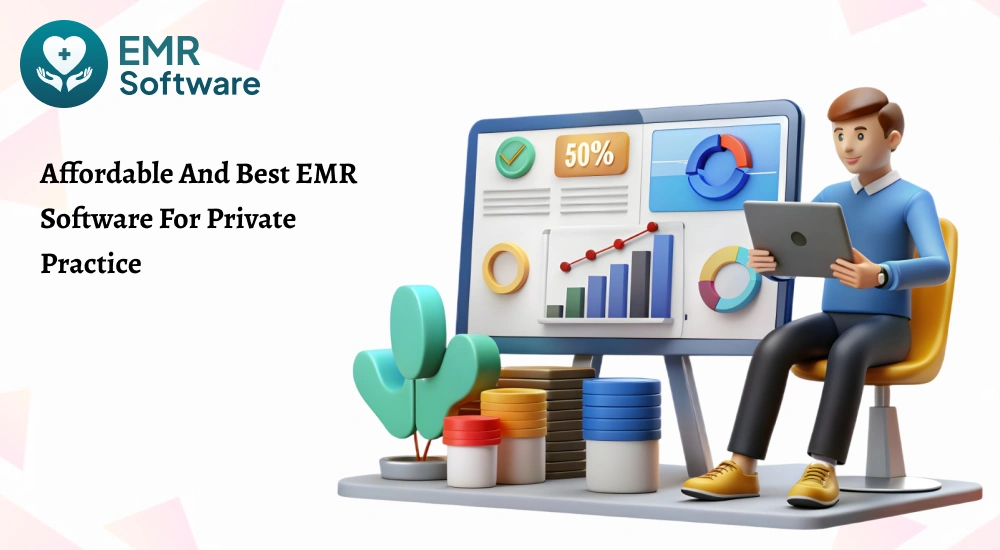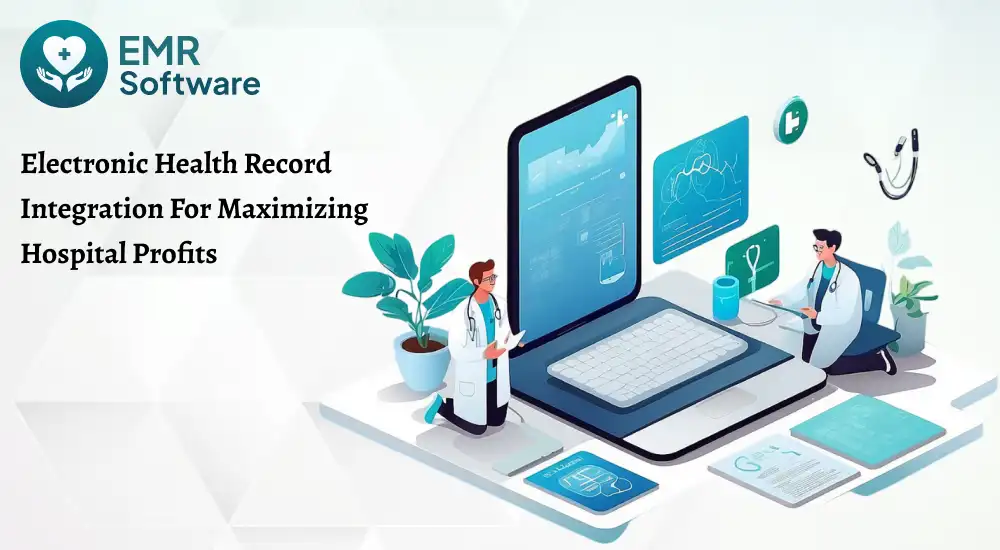Quick Summary
Each of the practitioners want to know about EHR and EMR software. But, the pivotal question, Is they similar or distinct? The answer is, they both have different purposes and functionalities. Although, they have some similarities. Astonishing, how one word makes a big difference. Let’s initiate the journey with us to understand the EMR v/s EHR and which one to select.
Introduction
Most of the healthcare centres and sometimes, technological consultants are confused with the EMR and EHR terminology. The electronic medical record (EMR) is the platform used for digitizing healthcare records whereas the electronic health record (EHR), collecting varied datasets and assisting for patient treatment.
If you are in the healthcare centre, it is important for you to understand the AI-powered EMR software v/s EHR software. Then, you are able to improve your healthcare practice and simplify for you to make an investment decision. Furthermore, the EMR and EHR software are the two different sides that have diverse functionalities. If you use them in a correct manner, no one can stop you to accomplish the heights of healthcare success.
A slight mistake in selecting software can make a big difference in the healthcare budget. There is a possibility, it affects the exhaustive healthcare infrastructure and might cut down the expenses for vital things. In healthcare, each of the activities is vital like sterile cleaning, inventory management, treatment plans, or appointment management.
Sometimes, skipping the single step costs you more or might even one’s life. Always take strategic decisions in the healthcare sector.
True Difference Between EMR v/s EHR Systems
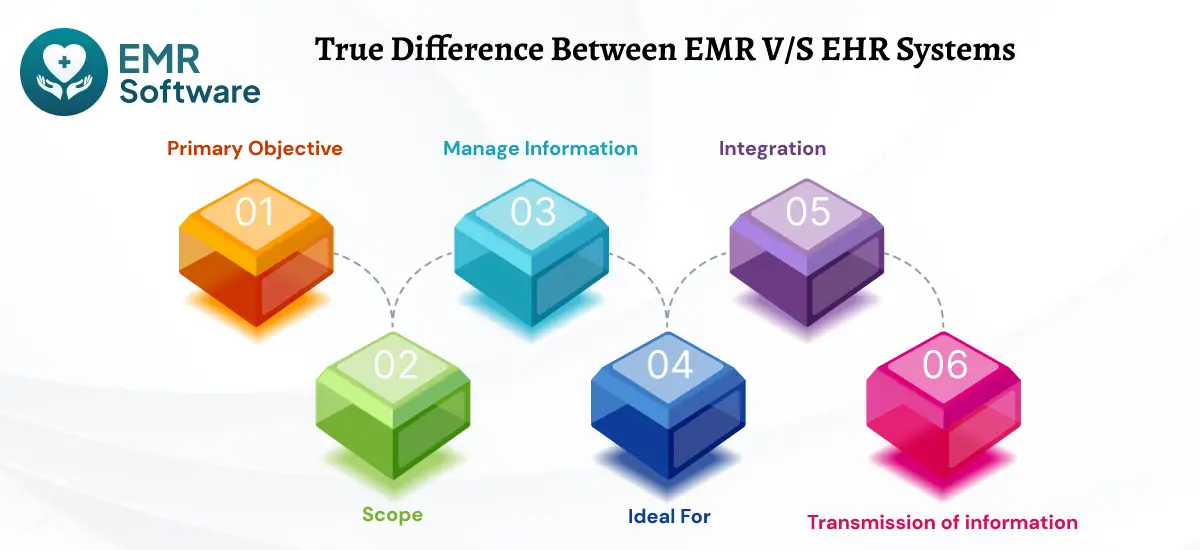
Image Description
| Features | EMR Software | EHR Software |
| Primary Objective | Digitized records | Integrated care and efficiency |
| Scope | Individual practitioner | Multiple healthcare provider |
| Manage Information | Administer data of single clinic / hospital | Exhaustive record of different hospitals of same branch |
| Ideal for | Solo practitioners and small clinics | Multi-specialty hospital and large hospitals |
| Integration | Basic level | Incorporate with third-party systems |
| Transmission of Information | Share documents within healthcare | Sharing medical files across healthcare centres. |
Undoubtedly, the AI-powered EMR software and electronic health record supervise the clinical documents stunningly. The main difference you find in the uses and their functionalities like EMR has the basic attributes whereas the EHR has high-end attributes. Let’s have the eye-sight on EMR v/s EHR differences, which are very crucial for you to know :
Primary Objective
If we talk about electronic medical records, their objective is limited to only adopting the digitalization approach in the healthcare industry instead of the traditional healthcare system for saving paper costs. Electronic patient charts simplify understanding and there is less difficulty for right treatment.
However, the electronic health record software has the broad objective, not simply digitizing records. The prominent objective is to improve the integrated care, enhance the hospital efficiency, and enhance the treatment outcomes. Beyond the basic management of healthcare data, aim to swiftly progress patient health.
Scope
The electronic medical records system has limited functionality than the electronic health record software. Their roles are different, EMR is designed for basic clinical duties whereas the EHR is built for big organizations.
EMR is the better option, if you want to perform basic operations like recording patient data, creating bills, and generating the prescriptions. However, the electronic health record system is the bigger picture as it manages the multiple health centres of the same branch and patients store their prescriptions or other documents from different providers.
Administering the overall patient health, then move towards the electronic health record software. Furthermore, it also creates bills and prescriptions but it embeds with the QR code and smoothly transferable to any division or practitioner.
Manage Information
This is one of the main characteristics that completely change the whole picture. The EMR software is able to supervise the limited healthcare details but if you go for the wider information, turn to EHR software.
EMR software stored the data with the basic security guidelines but the EHR gives the first priority to document security. Holds documents with the ICD-1O codes and gives significant contribution in cost reduction.
Coordinated care happens when you have the exhaustive records, similarly in the case of the electronic health record system. For individual care, you should use the electronic medical record system.
Ideal For
After understanding the differences in terms of scope, functionalities, data management, and objective. A small clinic or solo practitioner should purchase the electronic medical record system due to the presence of certain and vital functions that are sufficient to digitize the records.
If you are interested in high-end functionalities, might opt for the electronic health record system. We provide one suggestion to you, pick the EHR system software when you have the charge of large organizations and multi-specialty centres. Make this decision very wisely as one wrong decision affects the entire healthcare organization.
Integration
Before going to the integration feature, ask yourself one question, what you actually require in your hospital. Are you looking for individual or integrated care? For individual care, you need the basic level of integration that simplifies the clinical services. However, if you wish for integrated care, keep your eyes on the electronic health record system.
Honestly, you should pick the electronic health record software for running the healthcare successfully. Assisting to swiftly increase the level of income as it shares the data with other clinical systems, simplifying to discharge clinical duties securely and discussing on the patient case.
Transmission of information
Unfortunately, the electronic medical record system does not offer the integrated system but that doesn’t mean it is not helpful for sharing healthcare documents. The electronic medical record system shares electronic patient charts, treatment reports, medical files or a patient prescription within their healthcare.
However, the electronic health record system is the breathtaking healthcare solution that streamlines any patient or medical charts and medical documents to other medical centres effortlessly. Also, they can share the chats of one healthcare provider to other specialists for clearly examining the patient case.
Exclusive Breakdown : Common Gains of Electronic Health Record and Electronic Medical Record
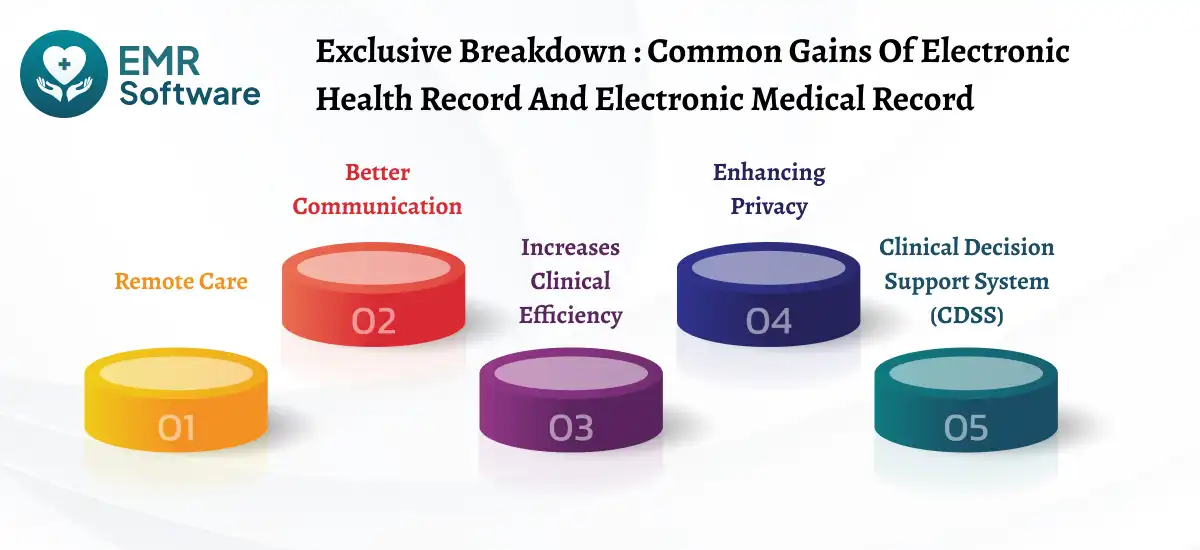
In general sense, healthcare organizations harness the EMR and EHR software for impressing clients and reducing the stress of healthcare duties. Furthermore, you will get the historical medical data easily and will go in-depth in the patient case. It upgrades the way of performing operational tasks and swiftly capturing the current medical information. Breakdown the common gains of electronic medical record system and electronic health record system.
Remote Care
You will get the virtual care when you adopt the electronic health record or electronic medical record solution precisely. Moreover, holding medical details from any part of the world can be transmitted to any part of the zone easily. The EMR or EHR software supervise medical services and simplify to track them regularly.
Persistently check the patient performance from the electronic device and oversee duties remotely. Furthermore, the EMR or EHR system solution helps to know the aggregate health results, how many people suffer from a certain duration and improve the process of connecting with the people.
Better Communication
A centralized medical platform assimilates the vast details of healthcare and patient, seamlessly transmission of crucial documents from one to another unit. Furthermore, the EMR or EHR software is better for the solo practitioners as they interact across healthcare settings, consistently learn from them and grow their practice.
Not only it supervises internal communication but also streamlines external communication. Furthermore, the electronic health record solution or electronic medical record solution augments the flow of clinical operations and simplifies for providers or patients to have seamless conversation.
Increases Clinical Efficiency
Enhancing the operational aspect of the hospital sector and enhancing the patient care procedure. The electronic health record system has colossal capabilities to hold clinical information and simplifies to transfer internal or external medical reports. When the data is quickly delivered to the desired provider, mitigating the situation of information gap.
Record the extensive clinical or patient medical histories that generate the extra-ordinary treatment plans, summarizes medical information in the report format that is helpful for a multiple purpose, and improves team coordination or enhances outcomes. As per recent study, the electronic health record mitigates the 30% healthcare errors and provides quick support to providers or internal employees.
Enhancing Privacy
When speaking about the management of healthcare operations, nothing comes first then the data security. The electronic health record system maintains the guidelines throughout clinical workflows from creating documents to generate medical bills. Also, implies regulations while communicating with any of the providers or specialists.
When you protect the clinical information, it automatically decreases your clinical expenditure and increases efficiency. Furthermore, the electronic medical record system augments data precision and improves the grade of clinical workflows. The security principles restrict the accessibility of hospital information to outsiders and increase clinical efficiency in no time.
Clinical Decision Support System (CDSS)
When you have fragmented medical information, it is much difficult for making precise decisions and actions. Assimilated data simplifying to drive actionable reports for making healthcare decisions. Moreover, it elevates the healthcare workflow and enhances the output level.
Decreases the paper work and simplifies the flow of medical work efficiently by using the digitized healthcare platform. Furthermore, the electronic medical record software generates the collective information in the report format, simplifying to interpret information and enhances the efficiency level.
EMR V/s EHR: Which One To Select For Your Healthcare Organization?
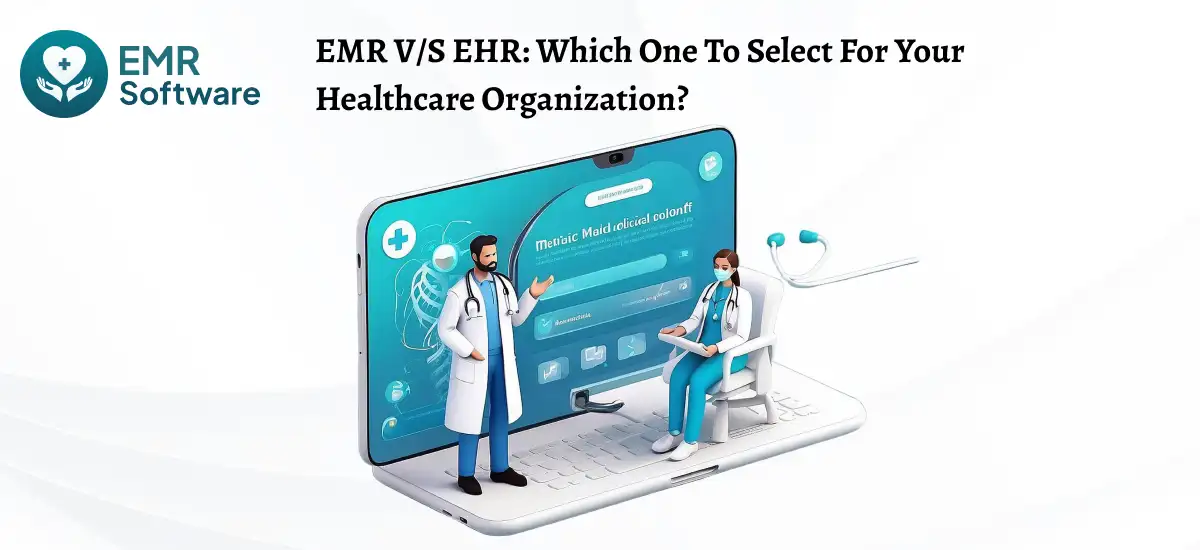
This is the right time to adopt the modern healthcare approach for storing information, monitoring data, and connecting with patients. EMR v/s EHR software, the contemporary method for improving the healthcare records, making the practical decisions, and simplifying patient diagnosis.
Might you be in a dilemma, which one to pick EMR or EMR? Obviously, there is a huge distinction between EMR v/s EHR software. As we compared both of them, we discovered that when you have immense information to manage, track, and supervise the multiple healthcare duties. The electronic health record is the best for you.
However, what if you have a small dataset to manage or one clinic? Then, it is not right to go for the electronic health record solution. In that situation, EMR software is the one for you. The EHR system helps you to safely transmit records from one provider to outside specialists that cannot be possible in the case of the electronic medical record solution.
Conclusion
The electronic medical record software and electronic health record software look like the identical terms but they have a major difference in terms of objective, manage information, scope, integration, and share healthcare data. However, they have some common gains such as immense communication, clinical decision support system (CDSS), increased privacy, and improved clinical efficiency. Furthermore, the EMR software is for solo practitioners, small clinics, or might be for the mid-level hospital. The electronic health record solution, suitable for multi-specialities hospitals and large healthcare organizations.
